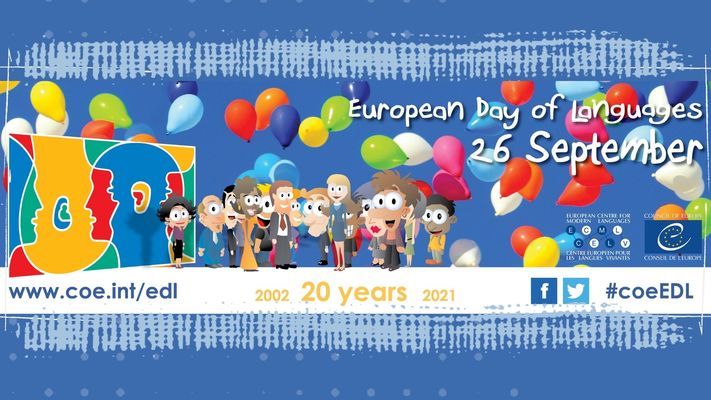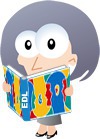
Throughout Europe, 800 million Europeans are represented in the Council of Europe's 47 member states and all are encouraged to discover more languages at any age, as part of or alongside their studies. This stems from the Council of Europe’s conviction that linguistic diversity is a tool for achieving greater intercultural understanding and a key element in the rich cultural heritage of our continent. Therefore, the Council of Europe, in Strasbourg, promotes plurilingualism in the whole of Europe.
https://edl.ecml.at/Home/tabid/1455/language/en-GB/Default.aspx
SEPTEMBER 2021
EUROPEAN DAY of LANGUAGES
On this page teachers can share ideas and activities for EDL, that we can all use with our classes and also upload photos, descriptions of their activities they have planned and done. We can check them during Language classes and watch them with our students.
LICEUL TEHNOLOGIC OCTAVIAN GOGA JIBOU, ROMANIA
ACTIVITY 1:
Did you know this about... Romanian?
1. In the Romanian language, the same words can have a different meaning depending on where you place the accent e.g. véselă – vesélă (happy – tableware). The name “Romania” comes from the Latin word “Romanus” which means “citizen of the Roman Empire.”
2. Although it is classified as a romance language, Romanian has developed a very distinct phonology and grammar system different from other Romance languages. Historians believe that this is due to Romania’s relative isolation from areas where the other Romance languages developed, and because of Romanian contact with Slavic-speaking peoples. For example, while most Romance languages have lost the Latin language differentiation between a long “o” and short “u”, fusing the two together, Romanian has retained this distinction. Another distinct feature Romanian has as a Romance language is the fact that it tends to replace consonants such as “k” and “g” with the labial consonants “b,” “m” or “p.”
3.The longest word in the dictionary containing only vowels is an onomatopoeia: "uiuiu". It is used as an interjection to express happiness. "Oaia aia e a ei, eu i-o iau" (That sheep is hers, I’m taking it) is a sentence made up only of vowels.
4. The Romanian language has no word for “shallow.” To describe something as shallow, people speaking Romanian usually use the word “small” (“small water” means “shallow water,” for example) or simply “not deep.”
5. The Institutul de Lingvisticǎ al Academiei Române (Institute for Linguistics of the Romanian Academy) was founded in 1866 under the name of the Romanian Literary Society which is a cultural forum responsible for cultivation of Romanian language, history and literature. From the very beginning its primary mission was to elaborate the three necessary instruments of a modern culture, namely to normalize the orthography, set down the grammar, and compile an exhaustive dictionary of the Romanian language.
www.academiaromana.ro
 ACTIVITY2: LANGUAGE QUIZ
ACTIVITY2: LANGUAGE QUIZ
Question 1: In which of the following countries is German an official language?
*German is the official language (or one of the official languages) of all of them.
Question 2: The official language of Azerbaijan is called?
*The official language of Azerbaijan is called Azeri.
Question 3: In which country is the language Cymraeg spoken?
*Cymraeg is a Celtic language spoken in Wales.
Question 4: Who was the founder of Esperanto?
*The artificial language (AL) Esperanto was founded by the Polish oculist Ludwig Lazarus Zamenhof. It was first published in Russian in 1887 under the title ‘An International Language’ using the pseudonym ‘Doktoro Esperanto’ (‘Doctor Hopeful’).
Question 5: Which book is considered to be the world's oldest?
*The Epic of Gilgamesh is believed to be the first ever written book. Είναι γνωστό ότι έχει γραφτεί στην Σουμερία soon after 2000 BC.
ACTIVITY 3: Celebrities speaking languages
Find out how many languages does your favourite celebrity speak and present it to the class.
ACTIVITY 4: PROVERBS, QUOTES, IDIOMS
Research the internet and find quotes, proverbs, idioms about the importance of learning languages and present them to the class.
ACTIVITY 5: Language Challenges
Choose one of the following challenges. You have one week to present it to the class.
Challenge 1: Say ‘I love you!’ in 5 different languages within 1 minute.
Challenge 2: Count from 1-10 in 3 different languages within 1 minute.
Challenge 3: Write down my favourite colour/sport/ hobby/animal in 3 different languages.
Challenge 4: Write down my 3 favourite words in a foreign language.
Challenge 5: Switch the language of your phone or tablet to a foreign language for one day (or longer!).
Challenge 6: Translate a song in a foreign language into your own language.
Challenge 7: Keep a journal in a foreign language for one week.
ACTIVITY 6: CREATE THE LOGO
Create the Logo of the European Day of Languages 2020.